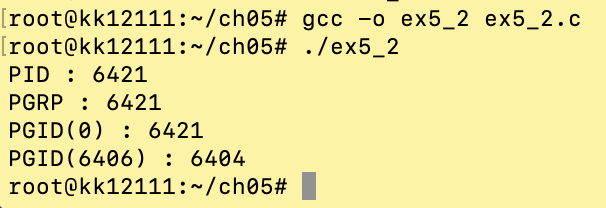반응형
#.pid 검색 - getpid, getppid 함수 사용하기
예제
결과

#.getpgrp, getpgid 함수 사용하기
예제
결과

#.getsid 함수 사용하기
예제
결과


#.environ 전역변수 사용하기
예제
결과

#.main 함수 인자 사용하기
예제
결과

#.getenv 함수 사용하기
예제
결과

#.putenv 함수 사용하기
예제
#.setenv 함수 사용하기
예제
예제파일
참고 : 유닉스시스템 프로그래밍(한빛미디어)
반응형
'컴퓨터 기초 > 운영체제 실습' 카테고리의 다른 글
| [운영체제 실습] 11.시그널 (0) | 2020.07.03 |
|---|---|
| [운영체제 실습] 10.프로세스 생성과 실행 (0) | 2020.06.28 |
| [운영체제 실습] 8.시스템 정보 다루기 - (그룹, 시간) (0) | 2020.06.27 |
| [운영체제 실습] 7.시스템 정보 다루기 - (로그인, 패스워드 정보) (0) | 2020.06.27 |
| [운영체제 실습] 6.파일과 디렉토리 (0) | 2020.06.25 |



